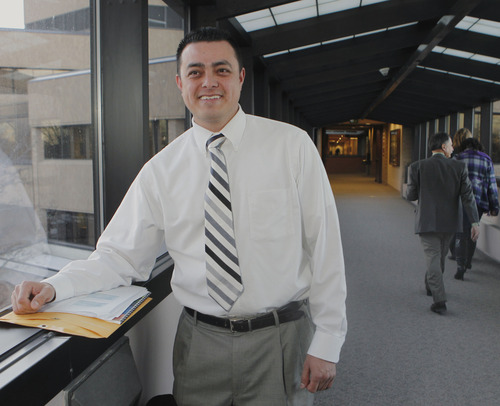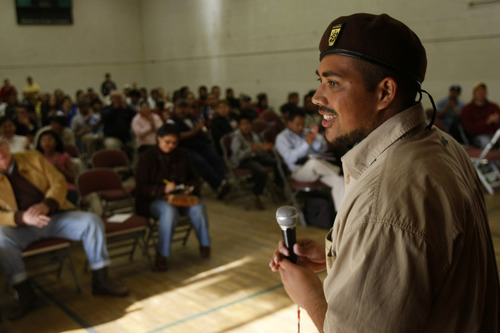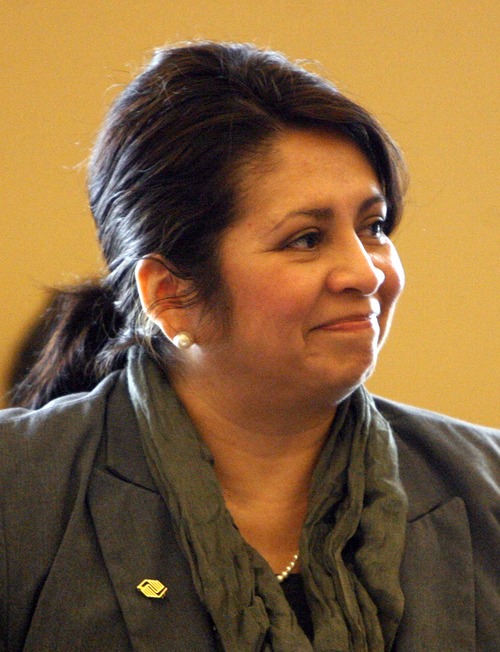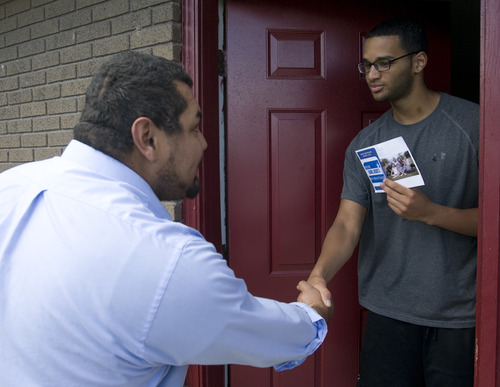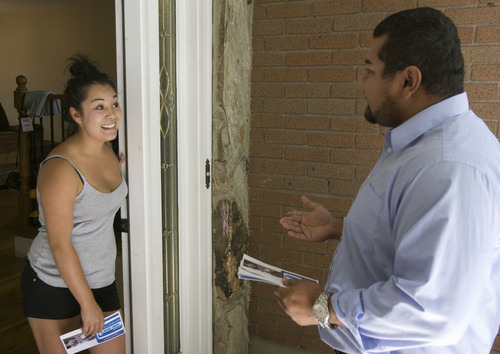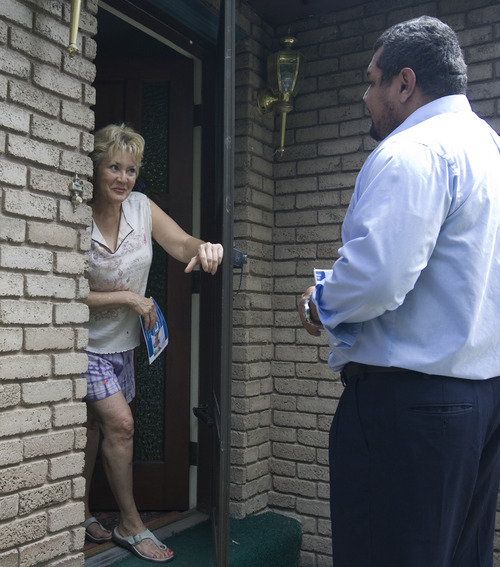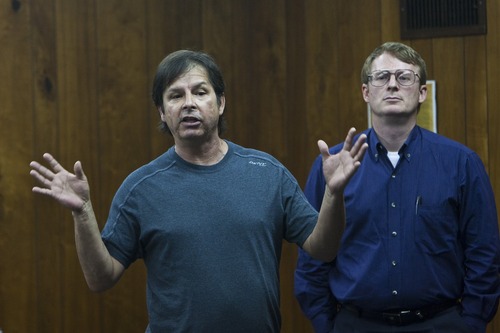This is an archived article that was published on sltrib.com in 2013, and information in the article may be outdated. It is provided only for personal research purposes and may not be reprinted.
Hispanic leaders are excited that nine Latinos are running in municipal elections in Salt Lake County this year — the most they can remember, and a sign that the growing minority may be starting to flex some political muscle.
Still, these candidates represent less than 6 percent of the 157 candidates running in the county's 16 cities. Latinos now make up 17.5 percent of the county's population. That shows how far minorities still have to go.
"It's just exciting to see this many Latinos running. I can't remember anything like it," says Daniel Argueta, who is running for mayor in West Jordan. He is the only Latino in a crowded field of nine mayoral candidates there.
More Latinos are running "because they are growing so fast here as a group," says University of Utah sociology professor Theresa Martinez. "When I moved here in the '90s, it was only [former state Sen.] Pete Suazo who was involved in any kind of election. That was unique for me because I'm from New Mexico, and we had senators and governors … because Latinos had like 36 percent of the population there."
Growth in recent decades among Latinos in Utah means "there is a new cadre of young Latino professionals seeking to serve," Martinez said, and four Latinos now serve in the 104-seat Utah Legislature. She adds that immigration reform "has become a real hot-button issue, and made more Latinos care about politics" and get involved.
—
More running • This year, West Valley City, West Jordan and Midvale each has two Latinos seeking office, and Alta, Murray and South Salt Lake each has one.
Some other minorities are also represented. For example, West Valley City Councilman Tom Huynh, who immigrated from Vietnam, is running for mayor there. And businessman Mani Grewal, who was born in India, is running for the Draper City Council.
The Latinos running this year vary greatly in their motivations for running — including activists on both sides of immigration battles, one part-Latino who identifies himself more as a Navajo, recent immigrants who say they want to give back to their new country, and some who say they are running not as Latinos but as candidates focusing on local issues.
Argueta is a cofounder of the Brown Berets of Utah and has been an activist seeking immigration reform.
"I'm running because I'm one of the people who is kind of fed up with asking for our rights and the rights of other people, and have it fall on deaf ears," the California-born Argueta, who also lived part of his childhood in Guatemala, said. "I've done the activism. I've done the walking and marching. It's time for a new strategy."
Tony Yapias, director of Proyecto Latino de Utah, says it is good strategy for Latinos to run for local office to start political careers.
"If they can get 500 or so Latinos or others committed to vote, they can get elected in many of these cities" because of low voter turnout, he said. "That's do-able, and many groups are out organizing to help." The Brown Berets, for example, have helped Argueta with canvassing.
Alex Segura, who is running for mayor of West Valley City, is on the extreme other side of the immigration debate. He cofounded the Utah Minuteman Project and traveled numerous times to the Mexican border to help fight illegal entry, and has vociferously opposed illegal immigration.
The Minuteman group almost ousted him once — the move failed by one vote — because he appeared with Yapias in a press conference asking Utahns to cool rhetoric on the immigration debate. Segura did not respond to requests for an interview for this story.
—
Giving back • Robert Orrigoni, an immigrant from Argentina, is making a second try to join the Murray City Council after failing two years ago. "It was a good experience, and I fell short by only 160 votes or so — not bad for a first try," he said, "I want to give back to my community. I am very thankful to Utah, which opened its doors to me in every single way."
Isaac Giron, a University of Utah student running for the West Jordan City Council, said he wants to make his city a better place to live, and encourage more minorities to become involved.
"Latinos are underrepresented in positions of power or responsibility. I want to take some steps forward. When I was in the July Fourth parade, it was cool for Latinos and Pacific islanders to see someone who looked like them running for office. Hopefully, it will motivate more of them to do so," he said.
Several candidates say they are not running to make any statement for Latino causes, but just to help improve their communities.
"I'm not running as a Latino, but as an individual who thinks that it is time for change in the community," said Olga de la Cruz, who is running for mayor of Midvale.
Joe Garcia, running for the West Valley City Council, said he's running as a member of the city planning commission who is upset the council has overturned too many of its decisions limiting pawn shops— and as someone who wants to fix problems with the city police. "I'm not running as a Latino, but as a person to represent all the people who want to improve the city."
William Hogan Espinoza, running for mayor of South Salt Lake, says he is part-Latino but identifies more with the Navajo portion of his family heritage as owner of the Navajo Hogan restaurant. But he says he is running "because I'm upset with city spending and how business fees have gone up."
—
Still-small percent • While more Latinos are running this year, why are the numbers still relatively small?
Maura Olivos, a third-generation U.S. Latina who is running for the Alta Town Council, says it may be that many Utah Latinos are still fairly recent immigrants. "The first generation is often focused on getting established and doesn't feel like it has a say, and English may not be that good. By the third generation they are more established and comfortable" to run.
De la Cruz said many Utah Latinos also may not have the contacts and networks needed to run and win yet. She said she built that by serving on city boards and in volunteer groups, and encourages others to follow suit.
Martinez said many people don't run simply because they don't think they can win — and may still be vastly outnumbered by non-minority neighbors. "You see them running in cities where there are more minorities, where they feel comfortable," she said.
Argueta adds that many people may feel they can't make much of a difference. "They feel disenfranchised."
That may also have hurt Latino voting turnout, which in turn may depress how many from that community run for office.
For example, the U.S. Census Bureau reported earlier this year that only 20.9 percent of Utah Latino citizens older than 18 voted last year. While low, that was up from 15.4 percent in 2008. In comparison, 60.4 percent of non-Latino whites Utah citizens voted last year. Non-Latino white cast 92.3 percent of Utah votes last year, while Latinos cast 4.8 percent.
Yapias said the greater number of Latinos running this year should lead to more in the future. "We've been used to others acting in our behalf. But we need to have more people of color run so that our voice will grow. When we see more people who look like us in office, they will be more sensitive to our needs — and Latinos will feel they can make a difference." —
Latino candidates in Salt Lake County municipal races
Alta • Maura Olivos, town council.
Midvale • Olga de la Cruz, mayor; Serafina Ochoa, city council.
Murray • Robert Orrigoni, city council.
South Salt Lake • William Hogan Espinoza, mayor.
West Jordan • Daniel Argueta, mayor; Isaac Giron, city council.
West Valley City • Alex Segura, mayor; Joe Garcia, city council.


